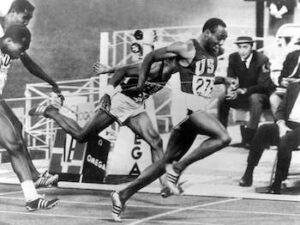
Jim Hines
*Jim Hines was born on this date in 1946. He was a Black track and field athlete and professional football player.
James Ray Hines was born in Dumas, Arkansas; Hines was raised in Oakland, California, and graduated from McClymonds High School in 1964. He was a baseball player in his younger years until track coach Jim Coleman saw his running talent, and Hines became a sprinter.
At the 1968 U.S. national championships in Sacramento, California, Hines became the first man to break the ten-second barrier in the 100-meter race, setting 9.9 (manual timing), with an electronic time of 10.03 – two other athletes, Ronnie Ray Smith behind him (electronic time 10.13) and Charles Greene on the other semi-final (electronic time 10.09) having the same official clocking. That evening of June 20, 1968, at Hughes Stadium, has been dubbed by track and field historians as the "Night of Speed."
Hines attended Texas Southern University and was a Texas Southern University Tigers track team member. A few months later, at the 1968 Mexico City Summer Olympics, with racial riots in America and a threat of a boycott by the black athletes of the U.S. team, he was in a tense situation. They were upset by the idea of admitting apartheid South Africa to the Games and revelations linking the head of the International Olympic Committee, Avery Brundage, to a racist and antisemitic country club. Hines reached the 100 m final and won it with the time 9.89 appearing on the screen, later corrected to 9.95.
The 9.89 was taken from a light beam across the finish line, while the official photographic process used Polaroid film, which took a couple of minutes to process and read. There was controversy over how his (slower appearing) automatic time of 9.95 should compare to the hand-timed 9.9 world record (Hines was again recorded at 9.9 in his 9.95 race). Automatic times start instantly with the sound of the gun, while hand times include human reaction time to start the watch.
It took until 1977 before fully automatic timing was required for world records. As the fastest electronic time to that point, Hines' mark was recognized exclusively as a new world record. The race was also significant for being the third all-black podium in Olympic history. Hines helped break another world record when he and his teammates sprinted to the 4 × 100 m relay gold at the same Games—he held the 100-meter world record for 15 years. Hines's world record remained unsurpassed until Calvin Smith ran a time of 9.93 in 1983. He competed in the 100 at a 1984 Masters Track and Field Competition at UCLA.
Professional football career
The Miami Dolphins of the NFL drafted Hines in the sixth round of the 1968 NFL Draft. Hines' final professional game was his first and only game with the Kansas City Chiefs 1970. In later years, Hines worked with inner-city youth in Houston and on oil rigs outside the city. Hines was inducted into the Texas Sports Hall of Fame class of 1994. Hines was also inducted into the Texas Track and Field Coaches Hall of Fame, class of 2016. Jim Hines died in Hayward, California, on June 3, 2023, at 76.